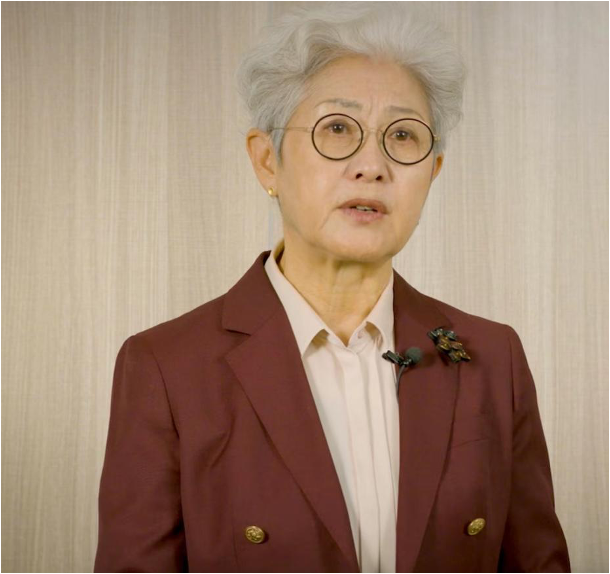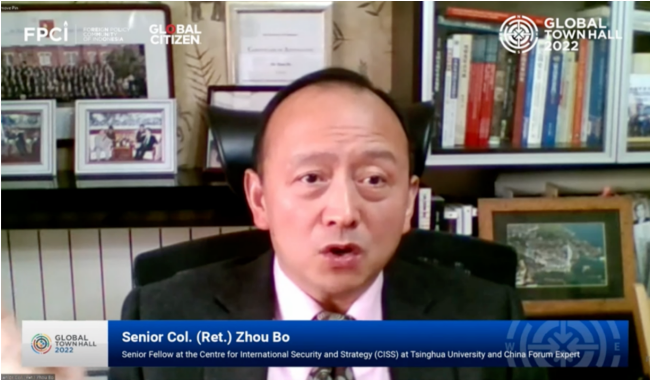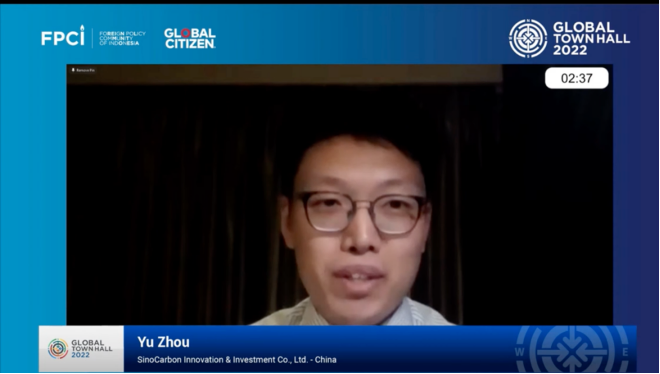On November 5-6, 2022, the Foreign Policy Community of Indonesia joined forces with an international consortium of think tanks to convene this year’s Global Town Hall, themed “Sustaining Peace and Development in a Divided World.” The Center for International Security and Strategy (CISS) of Tsinghua University is a partner of the conference. Mme. Fu Ying delivered a video message on geopolitics in a special session, and CISS Senior Fellow Zhou Bo spoke in Session 4 “The New Geopolitics of Rivalries: Can Major Powers Find Common Ground?” Yu Zhou, a Tsinghua alumnus, participated in Session 7 “From Youth-to-Youth: Generation Y and Z’s Agenda for a Better World.”

Video message by Mme. Fu Ying in a special session
Fu Ying kicked off her speech by noting that the Communist Party of China has just concluded its 20th National Congress, and that its report emphasized that China is committed to the policy of opening to the outside world and pursuing mutually beneficial partnerships. China’s growth will create new opportunities to the open global economy that delivers benefits to the people in the world, said Fu.
We’ve started to sense the return of the logic of geopolitics as security confrontation and military conflicts are arising in front of our eyes, warned Fu Ying. The US is provoking ‘strategic competition’ with China, and the Asia-Pacific region is also at the risk of returning to the front line of geopolitical conflict. This ‘geopolitics’-centered logic and discourse warrant our vigilance. During the early stage of industrialization, countries fought for controlling geographic space and access to key resources, and the logic of geopolitics offered the theoretical foundation for expansionism, said Fu. Since territories and resources were limited, expansionism inevitably ran into fights for sphere of influence and zero-sum competition, which even led to wars, hot and cold.
So the question arises: could we move beyond the geopolitical thinking and keep on building common prosperity? Fu Ying pointed out that Asia Pacific will probably be the first to make this choice at this major crossroad, to which the rest of the world is approaching. She believes that the majority countries in Asia want to see the momentum of peace and prosperity continue and prefer not to be forced to pick sides, much less to allow the original agenda to shift from economic issues to military and security concerns.
Looking back at the recent history of the region, Fu noted that the success of Asia lies in its commitment to cooperation for common economic benefit while taking the security concerns to the negotiating table, instead of resorting to confrontation. Countries have nurtured a sense of common security, and a network of meticulously intertwined dialogues has been developed here, including those on political and security coordination and on functional cooperation. This is what we call an ‘open regionalism’ around ASEAN centrality. The Asian way of dealing with differences offers a valuable experience for the world, said Fu. Taking the South China Sea as an example, she noted that this year marks the 20th anniversary of the signing of DOC (Declaration on the Conduct of Parties in the South China Sea), and the COC (The Code of Conduct in the South China Sea) is under the second round of text review.
At the end of her speech, Fu Ying called on countries to move beyond the narrow geopolitical thinking and cope with external uncertainties with regional unity, and promote global recovery with high-quality development and high-level cooperation.

Zhou Bo in Session 4 “The New Geopolitics of Rivalries: Can Major Powers Find Common Ground?”
Senior Colonel (ret.) Zhou Bo, senior fellow at CISS, participated in Session 4 “The New Geopolitics of Rivalries: Can Major Powers Find Common Ground?” The discussion, moderated by Kate O’Shaughnessy, research director at Perth USAsia Center, also featured Rui Matsukawa, senator at the House of Councilors of Japan; Bilahari Kausikan, former ambassador-at-large at the Ministry of Foreign Affairs of Singapore; and Michael J. Green, CEO of the United States Studies Centre at the University of Sydney. The discussants explored geopolitical competition and the risks to global cooperation, and analyzed whether major powers can find common ground as they navigate the current international landscape and how common global goals may be achieved.
There is hardly any reason to be optimistic about the future of China-US relations, cautioned Zhou Bo, saying that if climate was the only area where Washington would cooperate with Beijing, such cooperation looks like a tiny island in a vast ocean. When President Biden talks about the international order, he is actually talking about what he called the “liberal international order,” in which American primacy – and therefore leadership – are taken for granted. But there is no such order in the world, argued Zhou. The closest thing to the so-called “liberal international order” was at most the 15 years between the fall of the Soviet Union and the rise of China, which is only a moment in human history. Zhou believes that globalization has been disrupted, but not completely interrupted, and will re-emerge in a reorganized manner. He concluded his speech by mentioning the large number of Chinese students studying overseas every year and the size of Chinese investments abroad, saying that thanks to those connections, China will continue to stay open and will not be disconnected from the wider world.

Tsinghua alumnus Yu Zhou in Session 7 “From Youth-to-Youth: Generation Y and Z’s Agenda for a Better World”
Tsinghua alumnus Yu Zhou participated in Session 7 “From Youth-to-Youth: Generation Y and Z’s Agenda for a Better World” on referral from CISS. Sharing his experience at the Asian Universities Alliance in Bali four years ago, he shared three pictures from the event, which showed young people from different countries wearing their own national costumes, participating in community activities, and collecting trash on the beach. Yu called on the younger generation to respect the cultures and history of each country and to strive towards the common goals of humankind (environmental protection, climate change, peace and development, etc.) He also called on the organizers to share the deliverables of this conference with the younger generation, so as to promote youth exchanges among countries.
At the Global Town Hall 2022, world leaders and leading minds gathered to discuss the most pressing issues, including geopolitical competition, global governance, the Ukraine crisis, and the world economy, in a 15-hour marathon of foreign policy sessions, with the aim of providing an independent and open platform for dialogue among countries on addressing common challenges together.
